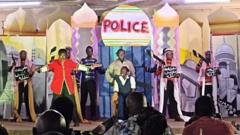Kenya's national high-school drama competition faced turmoil as police intervened to disperse crowds during the controversial performance "Echoes of War," reflecting the country's pressing issues and youth power.
Police Action Overshadows Kenya's High School Drama Competition

Police Action Overshadows Kenya's High School Drama Competition
Tear gas and protests erupt at national drama festival highlighting societal issues and youth activism.
The national high-school drama festival in Kenya has been embroiled in controversy as police fired tear gas to disband an audience eager to witness a provocative play that underscores the role of youth in societal change. The production, titled "Echoes of War," written by former senator Cleophas Malala for Butere Girls School, has been a focal point of heated discussions surrounding governance and the empowerment of young people to influence political landscapes.
Initially disqualified under ambiguous circumstances, the play was reinstated following a High Court ruling, which mandated its inclusion in the competition. Tensions escalated in Nakuru when students, expressing their discontent over Malala's exclusion from final rehearsals, walked out in unison, leading to increased police presence and crowd control measures.
Remarkably, Malala, who authored the piece, was prevented from engaging with the students before their performance due to police intervention but was later released without charges. He lauded the students for their act of defiance, highlighting their bravery in standing up for their right to express themselves artistically.
As the drama began to unfold, students sang the national anthem before exiting the venue when confronted with riot police, armed with tear gas canisters. Reacting to the police's action, a student expressed her confusion, questioning, "There's no audience. Who are we performing for?"
The incident sparked public discourse on the role of state-sponsored repression against free expression, with organizations like Amnesty International expressing alarm over the implications for human rights in the country. Critics, including prominent opposition leader Kalonzo Musyoka, condemned the police's handling of the situation, noting the necessary space for youth voices in leadership discussions.
The backdrop of this drama encapsulates a generational divide in Kenya, where the youth are increasingly vocal about their political concerns, particularly in light of protests that erupted last year. The unfolding events during the drama festival highlight a growing demand for change and the importance of dialogue centered around innovation and the digital landscape in governance.






















